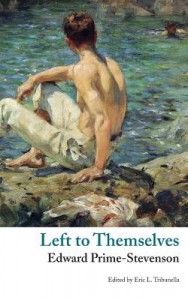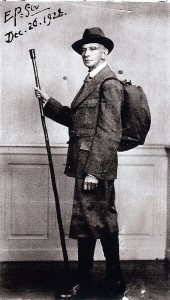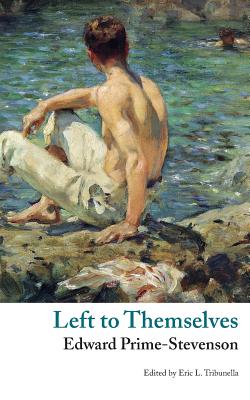 Left to Themselves: Being the Ordeal of Philip and Gerald
Left to Themselves: Being the Ordeal of Philip and Gerald
by Edward Prime-Stevenson
Edited by Eric L. Tribunella
Valancourt Books. 207 pages, $17.99
EDWARD Irenaeus Prime-Stevenson (1858–1942), writing as Xavier Mayne, was the first American writer to deal openly with homosexuality, both in fiction and nonfiction. In both forms Mayne transmitted the ideas of such pioneers of the early homosexual emancipation movement as Karl Heinrich Ulrichs, Magnus Hirschfeld, and Richard von Krafft-Ebing, as well as a vast body of knowledge on the subject.
His novel, Imre: A Memorandum, was self-published by “Xavier Mayne” in Naples in 1906. A story of love between two men—an Englishman who is “past thirty” and a 25-year-old Hungarian officer—it is highly didactic. At one point, in declaring his love for the younger man, the Englishman goes into a fifty-page monologue in which he describes his own life and recounts the theories and wisdom about “the Love which is Friendship.” The novel ends happily, with the two men united after long tribulations.
The ideas put forward in Imre found much greater expression two years later in Prime-Stevenson’s (as “Xavier Mayne”) magnum opus, The Intersexes: A History of Similisexualism as a Problem in Social Life, which was privately printed, apparently in Rome, in 1908. This is an amazing book for its time and even now. The Intersexes covers an astonishing range of topics in its 646 pages, including animal studies, “similisexual” love in the ancient world and among primitive peoples, gay geniuses, literature with homoerotic themes, ancient and modern legislation, Uranian life in major American and European cities, male prostitution, blackmail, and violence.
Fifteen years before The Intersexes, Prime-Stevenson wrote Left to Themselves under his own name. Its theme is romantic male friendship between two boys. The novel was written for young adults, it was reviewed favorably, and it ends happily. Later, in The Intersexes, Prime-Stevenson would write: “The sentiment of uranian adolescence is more distinguishable in another book for lads, ‘Philip and Gerald,’ by the same hand [his own]: a romantic story in which a youth in his latter teens is irresistibly attracted to a much younger lad, and becomes, con amore responsible for the latter’s personal safety, in a series of events that throw them together—for life.”
Especially in the beginning, Left to Themselves owes much to the boys books of Horatio Alger—perhaps the most misrepresented and underrated author in American literature. The older boy, Philip, is seventeen or eighteen years old, the ward of a hotel proprietor. Philip rescues Gerald, who is twelve, the son of a rich businessman, from a hobo who’s trying to steal the boy’s watch. The two become inseparable friends, and their relationship is encouraged by the adult men. When Gerald’s father writes for his son to join him in Canada, Philip is appointed as his companion and protector, and the two boys set off on an ill-fated journey in which they experience one mishap after another. They are shipwrecked; they are falsely accused of crimes; they are persistently pursued by a mysterious stranger who, using various names and stratagems, tries to abduct one or both of them.

The stranger is eventually known as Winthrop Jennison, described as “a strikingly handsome and well-dressed man of about forty years of age,” but who looks much younger. Hmmm. Jennison’s pursuit of the boys seems to be sexual, but in the end it is disclosed, not very convincingly, that his designs on the boys were for criminal, not sexual, ends. Jennison’s crimes include bank robbery and forgery.
The dramatic high point of the novel is a confrontation between Philip and Jennison, who has been apprehended and put in jail. The evening before Jennison is to be transferred to another jail, he sends a message to Philip to visit him, as he has something important to tell him. After an internal struggle, Philip decides that he will go to hear what Jennison has to say.
Now, an important plot element is that Philip has lived under a shadow: his father had been convicted of being an accomplice in a bank robbery; he then died of a broken heart, leaving Philip an orphan to be cared for by his friend Mr. Ward. In their jailhouse confrontation, Jennison proves indeed to be a crook, but perhaps not so much of a villain. He not only discloses to Philip that his father had been innocent, but gives him a document to prove it. Jennison himself had been the mastermind behind the bank robbery and had devised the frame-up of Philip’s father.
Before he’s taken away, Jennison makes an unexpected request: “Would you—will you shake hands? You’re a plucky fellow, Touchstone [Philip]. I’d a little rather not think of you as going through life with a grudge against me.” Philip blushes, hesitates, and stammers, “half inclined to take the outstretched gloved hand. But no—not that! He kept back his honest palm.” There is a curiously erotic tension to this episode, which hints that something more than handshaking may be implied. Almost paralyzed in indecision, unable to raise his hand, Philip parts: “‘Good-night, Mr. Jennison,’ he said, bowing gravely. ‘I—I—shall not forget you.’”
The novel is filled with coded homoerotic hints and references. Perhaps the most overt is when Jennison says to Philip: “Nice youngster that Master Gerald is! Not extraordinary that strangers should take a fancy to him, eh? Pretty boy!”
Left to Themselves is of historical interest, but it is not a great novel. Prime-Stevenson was no Horatio Alger. He did not have a gift for dialogue; most of his conversations are stiff and lifeless. Editor Eric L. Tribunella has written a long introduction that provides background information and an analysis of the novel. There are five appendices, consisting of contemporary reviews and excerpts from the writings of Prime-Stevenson, Havelock Ellis, and John Addington Symonds. The contemporary reviews were positive: none of them detected transgressive sexuality, and one even praised the novel for “its decisive religious undertone.”
John Lauritsen wrote the chapter on Prime-Stevenson for Before Stonewall: Activists for Gay and Lesbian Rights in Historical Context (Routledge, 2002).






